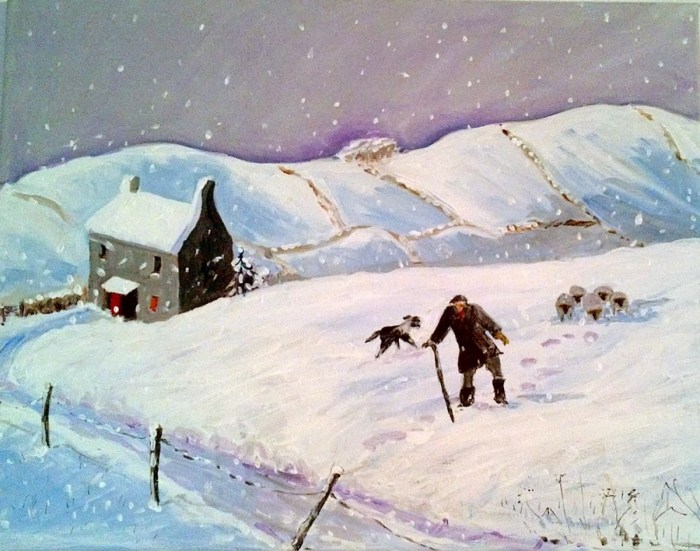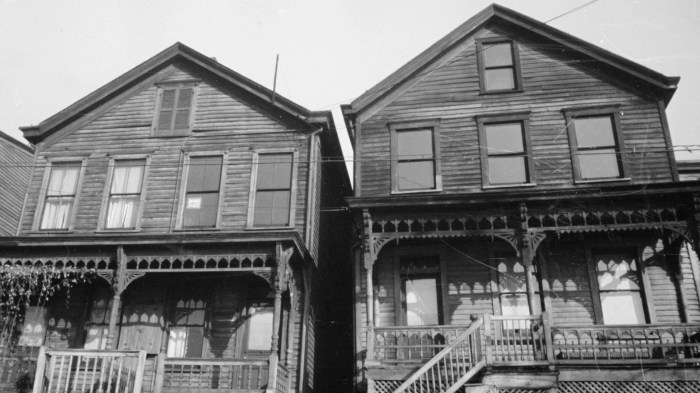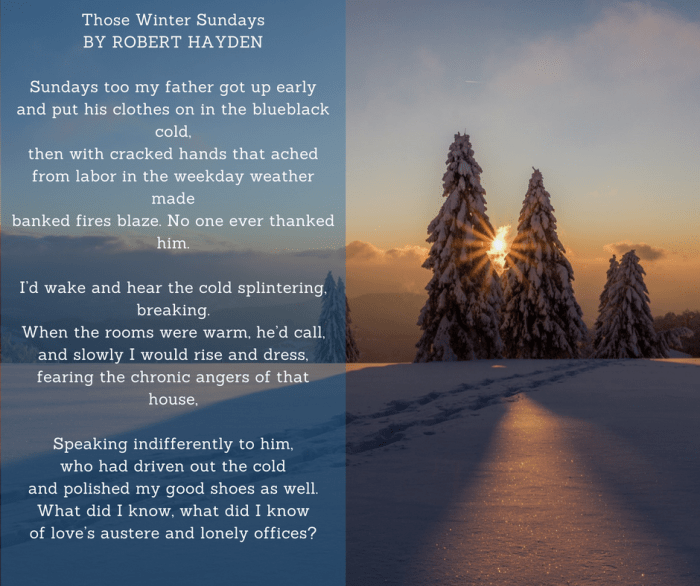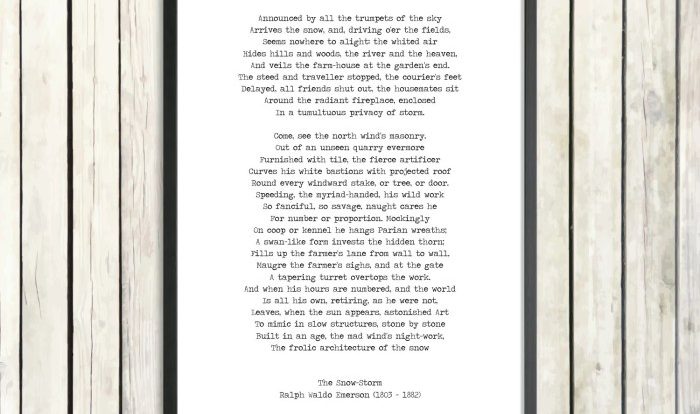Literary devices in those winter sundays – In Robert Hayden’s poignant poem “Those Winter Sundays,” literary devices play a crucial role in conveying the speaker’s experiences, emotions, and themes. Through imagery, metaphor, personification, irony, and rhythm, Hayden creates a vivid and evocative narrative that explores the complexities of familial relationships and the human condition.
The poem’s vivid imagery and symbolism immerse readers in the speaker’s memories of his father’s sacrifices and the emotional distance between them. Metaphors and similes enhance the poem’s themes and tone, while personification and pathetic fallacy humanize the setting and convey the speaker’s emotions.
Irony and paradox create tension and emphasize the poem’s central themes, while rhythm and sound devices contribute to its musicality and emotional impact.
Literary Devices in “Those Winter Sundays”
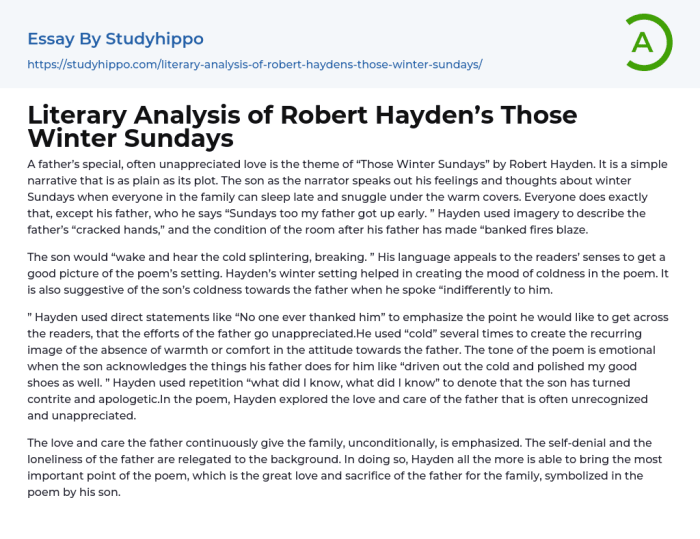
Robert Hayden’s “Those Winter Sundays” employs a rich array of literary devices to convey the complex emotions and experiences of the speaker. These devices contribute to the poem’s vivid imagery, emotional depth, and exploration of universal themes.
Imagery and Symbolism, Literary devices in those winter sundays
The poem is characterized by its vivid imagery and symbolism, which evoke the speaker’s experiences and the poem’s central themes. The recurring images of cold, darkness, and isolation create a somber and evocative atmosphere, reflecting the speaker’s feelings of loneliness and alienation.
- Cold:The cold serves as a metaphor for the speaker’s emotional distance from his father. The “cracked hands” and “icy floors” suggest a lack of warmth and connection.
- Darkness:The darkness represents the speaker’s inner turmoil and the absence of light and hope in his life. The “banked fire” is a symbol of potential warmth and comfort, but it remains extinguished, leaving the speaker in darkness.
- Isolation:The speaker feels isolated from his father and from the world around him. The “wooden house” and “curtains” create a sense of confinement and separation.
Metaphor and Simile
Hayden uses metaphors and similes to create vivid comparisons and deepen the poem’s meaning. These literary devices contribute to the poem’s emotional impact and enhance its exploration of themes.
- “Banked fire”:The fire is a metaphor for the speaker’s father, who is seen as a source of potential warmth and comfort but remains distant and inaccessible.
- “Bluest pieces”:The “bluest pieces” of coal represent the speaker’s deepest emotions, which he keeps hidden from his father.
- “Shadows”:The shadows symbolize the speaker’s fears and uncertainties, which haunt him even in the presence of his father.
Personification and Pathetic Fallacy
The poem employs personification and pathetic fallacy to humanize the setting and convey the speaker’s emotions. These literary devices create a sense of empathy and connection between the reader and the speaker.
- “Wooden house”:The house is personified as a cold and unwelcoming place, reflecting the speaker’s feelings of alienation and isolation.
- “Curtains”:The curtains are personified as eavesdroppers, symbolizing the speaker’s sense of being watched and judged.
- “Furious fire”:The fire is personified as furious, reflecting the speaker’s inner turmoil and resentment towards his father.
Irony and Paradox
Hayden uses irony and paradox to create tension and emphasize the poem’s central themes. These literary devices highlight the contradictions and complexities of the speaker’s experiences.
- “Love’s austere and lonely offices”:This line is ironic, as it suggests that the speaker’s father’s love is both austere (cold and distant) and lonely (isolating).
- “Sundays too my father got up early”:This line is paradoxical, as it highlights the contrast between the father’s early rising (which suggests diligence and responsibility) and the speaker’s feelings of loneliness and isolation.
- “The only light in the whole house”:This line is ironic, as it suggests that the speaker’s father is the only source of light in the house, but his presence actually casts a shadow over the speaker’s life.
Rhythm and Sound Devices
Hayden uses rhythm and sound devices to create a musicality and emotional impact in the poem. These literary devices enhance the poem’s flow and contribute to its overall atmosphere.
- Assonance:The repetition of vowel sounds, such as the “i” sound in “fire” and “ice,” creates a sense of unity and cohesion.
- Consonance:The repetition of consonant sounds, such as the “s” sound in “Sundays” and “shadows,” creates a sense of rhythm and flow.
- Alliteration:The repetition of initial consonant sounds, such as the “f” sound in “father” and “fire,” creates a sense of emphasis and reinforces the poem’s themes.
FAQ Compilation: Literary Devices In Those Winter Sundays
What is the significance of the recurring images of cold, darkness, and isolation in the poem?
These images symbolize the emotional distance and lack of warmth in the speaker’s relationship with his father.
How does the metaphor of the “banked fire” contribute to the poem’s themes?
It suggests that the father’s love and care are present but hidden, like a fire that is not fully extinguished.
What is the effect of using personification in the poem?
It humanizes the setting and makes the objects seem more alive, reflecting the speaker’s emotional state.
